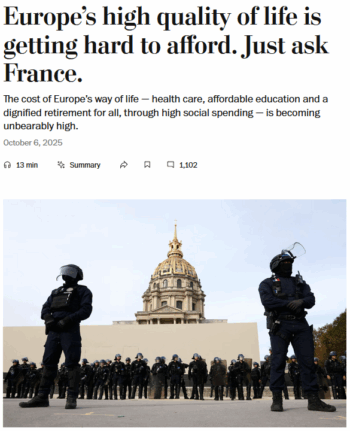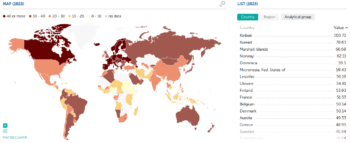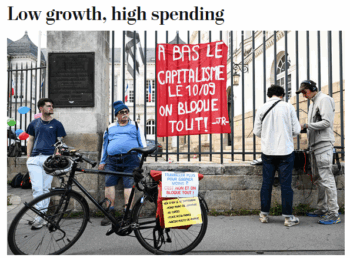
Washington Post (10/6/25): “Across Europe, and especially in France, the bill is coming due.”
The European welfare state has to die. At least, that’s what the Washington Post wants you to think.
In a recent news article (10/6/25) headlined “Europe’s High Quality of Life Is Getting Hard to Afford. Just Ask France,” the Post went on full offensive against European social spending. With the second sentence, the paper makes its message clear:
The cost of a signature brand of humanist economics—the so-called European way of life, offering healthcare, affordable education and a dignified retirement to all, through high social spending—is becoming unbearably high.
Could this be solved by raising taxes? No, of course not. The Post makes sure to remind us that Europe already has high taxes, and that hiking taxes “could drive away or kill businesses in a globalized world.” For good measure: “Some say Europe is already taxing its citizens and businesses too heavily.”
If taxes are not the solution, what is? Spending cuts! As we are told: “The hard math indicates that France’s uniquely generous social welfare system is part of the problem.”
In all, through the article, the reader gets a few stats meant to suggest the profligacy of European social spending, and a couple of vague gestures to the immense burden under which the over-taxed European rich are suffering. (We learn, for instance, of a crypto entrepreneur who “feels unwelcome, even unsafe, in a France clamoring for more resources from the rich.”)
Besides that, a few individuals are interviewed, and the Post uses these interviews to mischaracterize the political situation in France, saying that the main divide is “between those who want the country to change and those who insist it cannot.” The reality is quite different, with the split actually between those who want to cut social spending and those who want to raise taxes.
‘Confront mathematical reality’

Government revenue as a share of GDP in France (51%) is a bit lower than Finland (54%) and a bit higher than Belgium or Denmark (both 50%). Source: IMF.
The article—co-written by Annabelle Timsit, Anthony Faiola and Aaron Wiener—itself is confusing, somewhat lazily slapped together, and altogether not particularly interesting or compelling. And yet it is quite a useful piece to single out and respond to, because it is representative of precisely the sort of conventional wisdom that corporate media outlets have long liked to propagate (Extra!, 3–4/96, 9–10/05, 7/10; FAIR.org, 2/22/19, 7/5/23).
Even at outlets where number-crunching is more valued, there is a tendency to parrot tropes about reckless European spending and the mathematical impossibility of it continuing. A recent column at the Financial Times (9/13/25), for instance, urged European voters and politicians to “confront mathematical reality” on pensions and recognize the need for cuts.
To unpack just how wrong it is to argue that math, on some abstract level, dictates that European social spending must decrease, let’s look at France, which is the main country examined in the Post piece, and the highest spender on social protection in all of Europe.
Last year, France ran a budget deficit of close to 6% of GDP, a relatively high figure. Government revenue, from taxes and other receipts, came in at about 51% of GDP, also a relatively high figure. But not as high as in Norway, where government revenue sits at about 62% of GDP. If French government revenue jumped to around 57% of GDP, that would eliminate the deficit, while still leaving France short of Norway’s level of government revenue.
The point: The French government clearly has the capacity to plug the deficit through increased taxes.
‘This will mean cuts’

The Washington Post (10/6/25) contrasts “embarrassing” France with “humming” Spain—where the unemployment rate is 2.8 points higher than in France.
Yet the Washington Post, declining to cite any of these figures, tells its readers:
For France and Germany, long the pillars of the European Union, it is unclear that they can still afford to be the West’s guiding lights of economic justice.
This statement is blatantly false. As demonstrated, France has the capacity to afford its social spending through higher taxes, and it spends the most on social protection of any European country! Even with the aging of the population, that fact will not change.
Germany, for its part, has lower debt and lower government revenue, at around 46% of GDP, than France. It has plenty of room to raise taxes. The idea that these countries may not be able to afford their social spending is a fantasy the Post reporters are presenting to their readers as fact.
The Post goes on to quote the current German chancellor: “We simply can no longer afford the system we have today…. This will mean painful decisions. This will mean cuts.”
It follows this up with a description of how much income support a German family can receive from the government, calling it “an unthinkably high amount in the United States.” (For a family of four, the Post says, it’s “as much as” $70,475 per year, or about 60% of the median income for a similar US household.) Then, for balance, the Post quotes an opposition leader calling the chancellor’s claim “bullshit”—with dashes, of course, to protect readers with tender sensibilities. And the section ends with that.
But that’s not where you leave things, if you are a journalist in search of truth. The German chancellor made an empirical claim. It should be the role of a journalist to factcheck that claim. And if you do even the most basic research, you will see that the claim is objectively false. Instead, the Post takes a “both sides” approach: Let one party make a false claim and let the other say “bulls—-.” No need for further analysis.
Avoiding the antidote to far right

The Washington Post (10/6/25) portrays the conflict over social spending in France as an “intergenerational fight”—rather than a class struggle.
Beyond its decision to ignore data about government revenue in both France and Germany, the Post also fails to take into account what changes in other forms of spending mean for its claims about the unsustainability of European social spending. In particular, the commitment of NATO member states to increase military spending to 5% of GDP undercuts the claim that reductions to social spending are necessary. If other spending could increase, why does spending on the welfare state have to decline? Why not increase social spending rather than military spending?
Cuts to the welfare states of NATO members like France and Germany, therefore, would obviously reflect a political choice to build up military capacities rather than fund social spending.
Finally, a major backdrop to the discussion, which the Post briefly references, is the rise of the far right in Europe. It is important here to emphasize a simple fact: If European countries get economic policy wrong, neo-fascists could gain control of government. Previous austere policy measures, from extreme limits on spending in Germany that have left the country’s infrastructure crumbling to an increase in the retirement age in France that sparked mass protests, have already seeded the ground for the rise of the extreme right. Partly as a result of these policies, the Alternative for Deutschland (AfD) and National Rally (RN), the far-right parties of Germany and France, respectively, currently top parliamentary polls in each country.
Far-right parties thrive on the sort of social spending cuts that the Post is implicitly pushing for in its coverage. Protecting social spending while raising taxes on the well-off, on the other hand, could serve as an effective antidote to the rise of the far right—recent polling shows 85% in favor of budget adjustments “relying more heavily on the wealthy and large companies” in France, for example. The Post, however, seems to want to take this option off the table.
The effect of this journalistic approach is not hard to understand: The Post is heightening the prospects of a far-right takeover in Europe. The sort of lazy and misleading journalism, biased towards the interests of the wealthy, that it practices makes European fascism more likely. Journalists do not like to think of their work in these political terms. But that doesn’t make the political effects of their work any less real.
‘I’m the doting parent’

Jeff Bezos, the self-proclaimed “doting parent” of the Washington Post (CNN, 1/7/25), has repeatedly laid off staff at the paper because he doesn’t want to spend any of his $228 billion fortune subsidizing journalism.
Jeff Bezos, the billionaire owner of the Post, must be more than pleased. After a testy relationship with Donald Trump during his first term, Bezos has cozied up to the far-right US president over the last year. In October 2024, shortly before the presidential vote, Bezos killed a planned endorsement of Democratic candidate Kamala Harris by the Post’s editorial board. In February of 2025, he announced that the Post’s opinion section would now be writing daily “in support and defense of two pillars: personal liberties and free markets” (FAIR.org, 2/28/25). Just hours later, he was dining with Trump.
It’s not like the Post was a beacon of progressivism before this point. It had long clamored for cuts to the US welfare state, particularly to Social Security (FAIR.org, 3/19/18, 2/24/23, 6/15/23). But for Bezos, even that wasn’t enough.
And he has the power to force the change. As he commented after his decision to spike the paper’s Harris endorsement (CNN, 1/7/25): “The advantage I bring to the Post is when they need financial resources, I’m available…. I’m the doting parent in that regard.”
As it turns out, Bezos’s further injection of pro-wealthy bias is not limited to the opinion pages. It is clearly present in the news section as well. Whether these reporters are taking direct orders from Bezos is besides the point. All that matters is that their message is directly in line with his interests: The European welfare state must die, even if that means a turn to the far right in Europe.
You can send a message to the Washington Post at letters@washpost.com (or via Bluesky: @washingtonpost.com).
Please remember that respectful communication is the most effective. Feel free to leave a copy of your message in the comments thread on FAIR.org.
This post was originally published on FAIR.